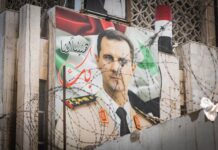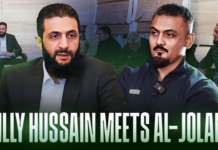When US journalists James Foley, Steven Sotloff and more recently British aid worker David Haines were beheaded, it sent shockwaves through both the journalistic and wider community, writes journalist Nina Arif.
The ISIS killers utilised social media to broadcast the gruesome acts and to unveil their “message to America.” In doing so, they also brought the world’s attention to the British jihadi connection, as the onscreen killer spoke with a “multicultural London English accent”.
Since then, I’ve sought to understand what motivates British Muslims to leave behind the comforts of home and take up arms to join the ISIS jihad.
Meet Taubah ibn Muthenna – a young, mixed race Brit who converted to Islam four years ago after a “bad” past. He now lives in the “Dowla” (Islamic State) where “it’s easier not to sin”.
On his Twitter, he poses with his AK47 and answers the questions of would-be jihadis from the UK. Putting my personal views aside (easier said than done), I began conversations with Muthenna who agreed to speak to me for the sake of “clearing up misconceptions” about jihad and ISIS.
“How’s life there? Is it what you expected?” I ask him to get the conversation going. “I didn’t expect this. I thought I would live in a desert or forest or mountains. But Alhamdulillah, we have everything here. We work for Allah in the day and rest at night and we live under the shade of the Shariah. People live with their families normally. It’s nice, Alhamdulillah.”
Subscribe to our newsletter and stay updated on the latest news and updates from around the Muslim world!
Muthenna is articulate, he’s been to university, he’s clued up on current affairs, he can cook and he’s handsome – not what I expected. He has no plan to return to Britain and is prepared to die fighting “jihad”.
Before I delve further, I’m curious to know more about his past. But he says it’s a long story and won’t get into that because he doesn’t want to glorify his pre-Islam life.
Muthenna is fairly easy to talk to and he has a sense of humour, as he jokingly blasts me (no pun intended) for my poor grasp of Arabic, “Aw miskeena [poor girl]… don’t worry, I won’t make takfir on you”.
And so I try my luck by probing into his past again, this time in jest. “Let me guess – in your pre-Islam life, you were in a gang of some sort, took drugs and went to jail?” He replies with “no comment”.
Perhaps those were my preconceived ideas about young zealous jihadis coming through. But it’s a legitimate point of contention; I’ve spoken to other jihadis who I suspected did flee from a “dark past” or a dull present reality, while caught up in ideological notions of being a warrior in a fantastical holy war.
So I put that argument to Muthenna, explaining that the social media antics of many ISIS fighters could also undermine their cause. “This is defamation of the mujahedeen”, he replies. “Who would be stupid enough to risk their life for glory? Don’t they know IS is fighting the world? The battlefield is a place of fitnah and if you don’t have emaan and you aren’t doing it for the sake of Allah, you won’t last long.”
But what about the laddish Facebook and Twitter status updates? “I think it sends a message that jihad is for all Muslims”.
Jihad
I ask him if he considers the physical jihad (fighting) to be more important than things like praying, fasting or giving charity. “I would say it has an equal, if not, greater importance because if there is no jihad, authentic Islam would disappear. Look at China – Muslims can’t fast or grow beards. Look at France – you can’t wear niqab. Look at the US and UK – you can’t even talk about jihad.”
It’s clear that discriminatory policies towards Muslims worldwide are a major motivation for Muthenna and many others like him. But these are grievances shared by most Muslims.
I wonder if holy war should be their answer and if the violence is actually counterproductive to the plight of Muslims, as it can serve to justify their demonisation. But Muthenna doesn’t see it like that, “We follow the example of Rasoolullah (saw) and his companions (ra). And they all spent their lives in jihad. How do you think Islam spread all over the world? The khalifa controlled a third of the world. They were living under Shariah.”
I don’t believe the typically “orientalist” assertion that Islam was spread by the sword, while mention of the Prophet (pbuh) makes me recall stories of how he would turn the other cheek.
Thus Muthenna’s answer prompts me to ask, “So you think jihad is currently being fought by those who are similar in character to the Prophet?” I’m a little surprised by his response, “They are closest. They selflessly give up worldly things for the deen, spilling their blood and living a hard life, while others live comfortably compromising their deen so they can live in safety under kufar.”
When I challenge him about his insinuation that Muslims living in the West, like me, have it easy, he clarifies, “I don’t mean all of them.”
Beheadings
Next, I ask about the beheadings,“Muslims as well as non-Muslims say the killings of James Foley and Steven Sotloff are not justifiable Islamically.” I ask him to respond. “I would say to them, do they have the same thoughts for the millions of Muslims killed by America, imprisoned and raped, humiliated? These Muslims talk from their nafs, and from an Islamic point of view, they have been softened by living under kuffar and they are not in touch with the Muslim world. We call them ‘house Muslims’.”
I remind Muthenna that the likes of Foley and Sotloff were non-combatants, but he answers with “…an eye for an eye. We fight them as they fight us. How many non-combatants have the kuffar killed?”
I tell him that Foley was a journalist who reported on the suffering of Muslims, but Muthenna undermines his integrity,“He was also in Iraq and Afghanistan with US soldiers speaking lies about the mujahideen and glorifying the crusaders. Also, his brother is in the US Air Force. He’s a kafir from the country that Muslims are at war with. He would cover up the atrocities they committed against Muslims.”
Muthenna also writes off Sotloff as an “Israeli spy”, and subsequently sends me a series of verses from Surah Taubah and numerous links to jihadi websites which he frequents.
He’s doing this to convince me, I’m sure. But as I read through some of the doctrine which he’s been taught, I’m saddened. I’ve known other young Muslims who’ve trodden that same path only to become disillusioned, realising that the true meanings of those Qur’anic texts and hadiths were skewered by their de-contextualised interpretations.
Except the Muslims who join ISIS will perhaps suffer a more detrimental fate, I think to myself, as I remember a conversation in which Muthenna told me he’s stopped counting dead bodies.
Soon Muthenna abruptly declines to be interviewed further. After I press him for a reason, he says he feels inadequate to represent ISIS.
Pledge of alliegance
I’m left wondering why someone with such apparent strong convictions feels unable to represent what he vehemently defends and fights for. This is just one of my unanswered questions.
Another is, why chose the name “Taubah ibn Muthenna?” Taubah means repentance. Muthenna was also the name of a revered warrior in Iraq’s history. Repentance through jihad perhaps? Or maybe I’m thinking too deeply. It could just be his way of directly linking himself to a Surah about jihad.
Muthenna had told me it was tawheed which made him become Muslim. I think his intentions and that of others like him were admirable and well-placed initially, but I also think many of these fighters have also been manipulated in the current situation because of their zeal.
With frequent battles among various Muslim groups, the situation in Iraq and Syria is far from clear-cut now. And with reports of the imprisonment of disenchanted ISIS fighters who attempt to flee, it’s difficult to know if there’s a way out. There’s definitely no easy way in – if any hope to return to Britain that is. So perhaps their fate is already sealed.
In the wider scheme of things, it’s ironic that ISIS makes a convenient rationale for a continued expansion of America’s presence in the region – the very thing they’re fighting to eradicate. I had hoped to ask Muthenna about this and to try to make him see things in another way. I hope he and others like him will be able to, before they pay the ultimate price for their pledge of allegiance to ISIS.














![The Taliban’s Road To Success [Short Film]](https://5pillarsuk.com/wp-content/uploads/2024/11/Kabul-roadworks-thumbnail-218x150.png)









